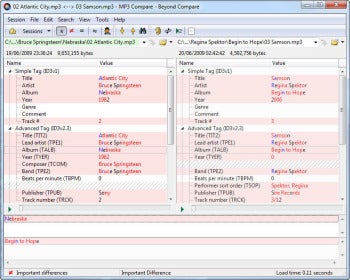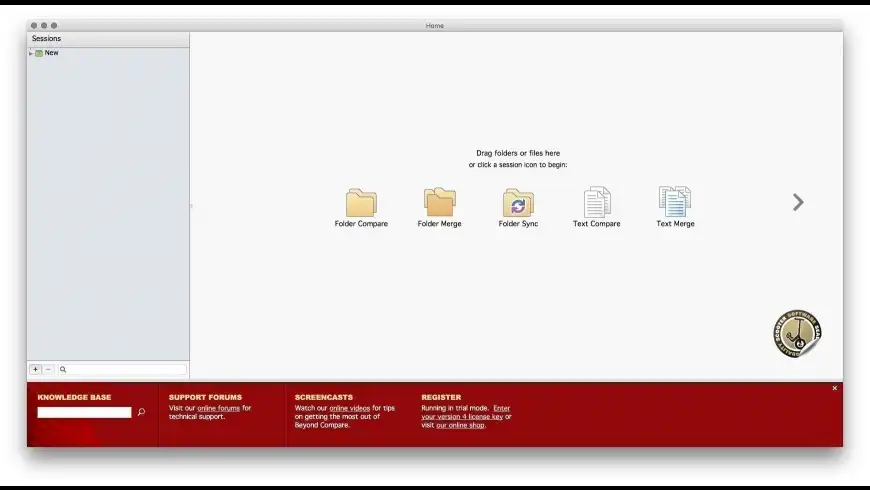- Beyond Compare File Formats Download
- Beyond Compare File Formats Pdf
- Beyond Compare Additional File Formats

Session settings define how, overall, a Folder Compare session should compare folders when the session is loaded. Comparison criteria include file timestamps, sizes, attributes and contents. Once the session is loaded, you can selectively recompare files by picking Actions Compare Contents or by opening the files in a file session.
Throughout my isolation-induced technology shenanigans, I’ve come across one tool that has proved absolutely critical in scanning through old hard drives: Scooter Software’s Beyond Compare.
- In the side-by-side grid, a worksheet for each file is compared to the worksheet in the other file, beginning with the leftmost worksheet in each. If a worksheet is hidden in a workbook, it's still shown and compared in Spreadsheet Compare. If the cells are too narrow to show the cell contents, click Resize Cells to Fit.
- In Beyond Compare, pick Tools File Formats. Pick the unwanted File Format from the list, and click Delete. Click Yes to confirm.
- Sublimerge can only compare entire file diffs, but not two selections within a file. Comparing within files can be useful for example, by refactoring two similar functions to use a shared function. With Sublimerge, you need to copy the sections into two new temporary tabs and compare between the two.
- Open-source, Python-based visual diff and merge tool for comparing files and folders.
If you’ve got a need to compare folders, text files, image files—really, anything that can be compared, Beyond Compare is the app you want. I looked at a handful of other comparison tools and spent a lot of time searching the web, trying to figure out the best way to reconcile lots of old files, and Beyond Compare was the one tool I found continually name-checked—and, as it turns out, for good reason.
Essentially, you can drag any two folders into Beyond Compare’s two panes and have it compare their contents. You can choose to have it show only the files that are missing on one side or the other, or all of the differences in files, or even just the files that are the same. Plus, you can add filters that exclude certain filename patterns (for example, I frequently set it up to ignore directories that begin with a period, since those hidden files are generally configuration files I didn’t care about).
Beyond Compare excels when comparing identical or very similar folder structures, and it offers options for comparing files, folder structure, both, or neither. Edius 6 full version with crack free download. But there are also commands that help when things don’t line up quite right. For example, the “Align with…” command lets you line up two sub-directories to compare, even if they don’t have the same name. If you need to go more in depth on files, Beyond Compare can also compare images and text documents, and can even provide side-by-side hex comparisons, which is way more than I need, but will doubtless prove useful to others.
The app can be a little tricky to use: it took me a while to get the hang of it, figuring out which views I wanted, and what all the various colored icons meant. (Purple, for example, are orphans—files on one side that aren’t on another, whereas red just means there are differences within the files.) One complication arose from the fact that my Synology NAS, which is now my official file server, is formatted with the BTRFS filesystem, and several of my older files got renamed, leading to lots of file differences that were merely differences in file name, not in content.1
I’ve spent a lot of time in Beyond Compare over the last few weeks, and I definitely got more adroit at using it as time went by, though I’m certain I missed features that could have saved me even more time. In the end, it still didn’t handle exactly the task I’d like it to—namely, scan a folder hierarchy and tell me all the files that are missing from another drive—but that’s a pretty intensive procedure that I frankly couldn’t find any software to handle. So I ended up spending a little more time manually drilling down into folder hierarchies and comparing file sizes and dates.
Despite those travails, Beyond Compare has proved to be more than worth its $30 price tag, not least of all for the peace of mind it brings in being sure that I have all of the data I want. (And, I’ll add, it has an extensive—and perhaps even too generous trial option that allowed me to do pretty much all of my comparisons for free, so I made sure to buy a license anyway.) If your file comparison needs are even more in-depth—say you need to handle three-file comparisons or folder merges—there’s also a $60 Pro version, but for most users, the standard will probably suffice.
Beyond Compare File Formats Download
- Fun trivia time! In the classic Mac OS, directory hierarchies were indicated using the colon (“:”). But, when Apple moved to Mac OS X, which was based on BSD, directories instead used the more common forward-slash (“/”) delimiter. Problem is, back in the classic Mac OS days, you could put all the forward-slashes you wanted in a filename and the system didn’t care—until you migrated all those files to Mac OS X, where the file system very much did not want slashes in file names. But, in order to keep backwards compatibility with classic APIs, Apple essentially converted all those slashes in file names to colons, but still displays them as forward slashes anywhere in the GUI. To this day, you can still put forward slashes in your filenames, but if you go and look in the Terminal, they’re colons. However, if you try to put colons in filenames, it’ll generally automatically use a hyphen instead. Computers are weird. ↩
[Dan Moren is the official Dan of Six Colors. You can find him on Twitter at @dmoren or reach him by email at dan@sixcolors.com. His latest novel, The Aleph Extraction, is out now and available in fine book stores everywhere, so be sure to pick up a copy.]
Beyond Compare File Formats Pdf
If you appreciate articles like this one, support us by becoming a Six Colors subscriber. Subscribers get access to an exclusive podcast, members-only stories, and a special community.
These settings control what is considered a difference in a folder session.

Quick tests
These comparison tests can be performed simply by reading folders and are much quicker than tests that require reading individual files.

Compare file size

Marks files as different if file sizes differ.
Compare timestamps
Compares files' date and time last modified. Timestamps must differ by more seconds than the second tolerance to be considered mismatches.
Ignore daylight saving difference ignores exact hour differences. This is useful for dealing with the way that different file systems handle Daylight Savings Time.
Ignore timezone differences ignores timestamp differences that are multiples of an exact hour.
Compare filename case

Marks files as different if character capitalizations differ.
Compare file attributes
Archive Root gt i9105p 4.2 2. compares files' archive attribute. Since merely copying a file can change its archive attribute, you should normally disable this option.
System compares files' system attribute.
Hidden compares files' hidden attribute.
Read-only compares files' read-only attribute.
Align filenames with different extensions
Lines up files whose filenames are the same except for the extensions.
Align filenames with different Unicode normalization forms
Lines up files whose filenames are Unicode equivalent.
Beyond Compare Additional File Formats
Tests that require reading files
Compare contents
Enables size or content-related comparisons.
CRC comparison compares files using their CRC values.
Binary comparison compares files byte-by-byte.
Rules-based comparison compares files based on their file format associations. Allows you to ignore differences in line endings, whitespace, or source code comments.
Skip if quick tests indicate files are the same improves comparison speed by only performing the slower, more thorough tests when timestamps are different.
Compare versions
Compares version information, typically stored in application files (.exe, .dll, .ocx, etc).
Override quick test results
Marks files as matching if a content comparison determines they match even if there are differences in timestamps or other quick tests.
